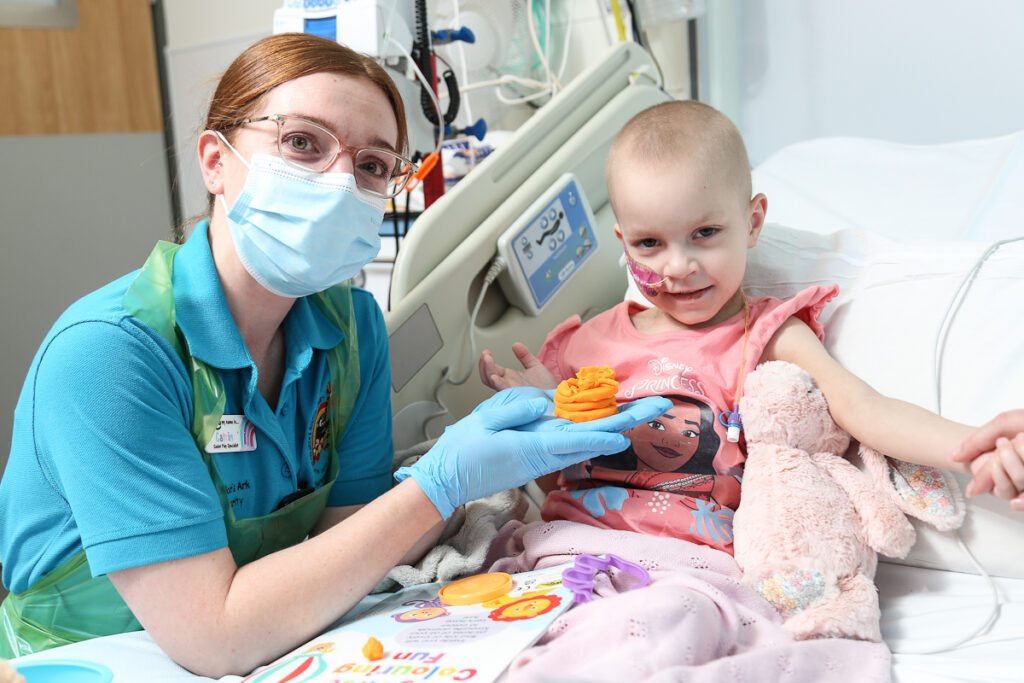Hospital can be an unsettling place for lots of reasons. You’re away from everything that’s familiar, you could be adjusting to a new diagnosis or treatment, too small or unable to communicate your needs, or have had a bad experience in a healthcare setting before. The therapeutic and specialised play service is here to help make the hospital experience a little less scary and overwhelming for young patients, reducing anxiety and helping children feel more in control of what’s happening around them. It’s thanks to you that the charity has been able to support this incredible service for 14 years.
The therapeutic and specialised play service supports an average of over 10,000 babies, children and young people every year. The service comprises of play specialists, play assistants and play workers who cover 13 key areas within the children’s hospital. Together, they are considered an invaluable support to both families and clinical staff alike.
The service supports children through their hospital journey in five key ways:
Preparation
Helping children understand what’s going to happen in a way that makes sense for their age and stage of development. This helps take away the fear of the unknown.
Distraction and coping
Using techniques or offering tools that help children manage procedures, from simple distractions to calming strategies that help them feel more in control.
After procedures
Supporting children to make sense of difficult or upsetting experiences. This can help clear up any misunderstandings and prepare them with better ways to cope next time.
Developmental play
Helping children understand what’s going to happen in a way that makes sense for their age and stage of development. This helps take away the fear of the unknown.
Everyday play
Creating a sense of normality by making sure children still get the chance to play how they would at home — helping them feel more like themselves in a medical environment.
Over the past 12 months....
- around 4,000 distraction sessions were provided during medical procedures.
- 10 years old were the most supported age group.
- 581 patients who received support from the play service had a diagnosed learning disability. close to 7,000 normalising play sessions were carried out across the hospital.
- 772 children with procedural anxiety received support from the team.
- Around 1,500 preparation sessions were delivered by a play professional.
- 719 patients supported by the service had previously had a traumatic medical experience.

Tilly's story
Tilly, who is one of triplets, is currently being treated on Rainbow Ward for a rare type of childhood cancer called neuroblastoma. She’s used to being at home playing with her brothers but has now been in hospital for many months, away from nursery and everything that’s familiar to her. Tilly looks forward to her time with Rainbow Ward play team members, Kylie, Allison and Catrin. For three-year-old Tilly, it’s just a chance to be with some of her favourite playmates but in reality, the team are helping her in many different ways.
The general play with her Barbie dolls and arts and crafts gives Tilly back a sense of the normality she’s lost from being at home or at nursery, while she’s also being encouraged to reach her developmental milestones through more focussed play (though Tilly doesn’t see the difference). But it’s also through play that the team prepare Tilly for procedures that could otherwise feel very frightening, helping her understand by role playing with specially adapted toys. The process also gves Tilly a sense of choice and control in a situation, at least where her treatment is concerned, she has very little. When Tilly recently faced a difficult scan, it was Kylie who gave her the tools and reassurance she needed to get through it.
Help us protect childhood through play this Christmas
Between Tuesday 2 and Tuesday 9 December 2025, any donation you make to our Power of Play Appeal will be DOUBLED as part of our Big Give Christmas Challenge. Keep an eye out on our Instagram and Facebook pages for more information at the end of November.







